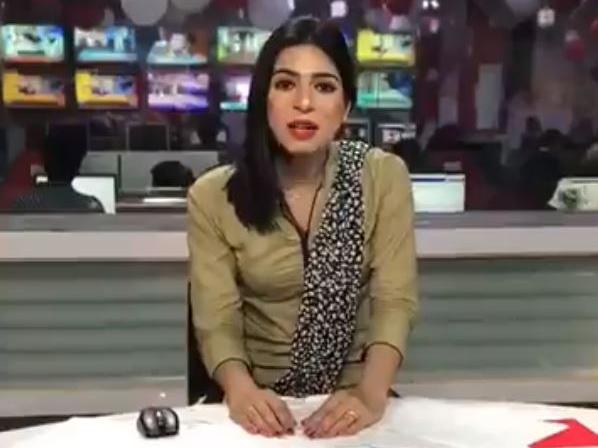Pakistani woman makes history as country's first transgender newsreader
Marvia Malik, 21, was 'disowned' by family but went on to become catwalk model

Your support helps us to tell the story
From reproductive rights to climate change to Big Tech, The Independent is on the ground when the story is developing. Whether it's investigating the financials of Elon Musk's pro-Trump PAC or producing our latest documentary, 'The A Word', which shines a light on the American women fighting for reproductive rights, we know how important it is to parse out the facts from the messaging.
At such a critical moment in US history, we need reporters on the ground. Your donation allows us to keep sending journalists to speak to both sides of the story.
The Independent is trusted by Americans across the entire political spectrum. And unlike many other quality news outlets, we choose not to lock Americans out of our reporting and analysis with paywalls. We believe quality journalism should be available to everyone, paid for by those who can afford it.
Your support makes all the difference.A Pakistani journalist has become the country’s first transgender newsreader, after being “disowned” by her family in a country where discrimination remains common.
Marvia Malik, 21, made her debut appearance on the Kohenoor TV news channel days after becoming the first transgender model on the catwalk at a prominent fashion show held annually by the Pakistan Fashion Design Council.
Transgender people face severe discrimination in Pakistan and many struggle to find jobs.
Many “hijras” – a term given to transgender people, intersex people and eunuchs – have been attacked, murdered, and raped in the country, as well as other South Asian nations such as India and Bangladesh. Many are forced to work as sex workers, dancers, or beggars.
However, campaigners say there are signs of progress in the conservative South Asian nation, where homosexuality is a crime.
Ms Malik, 21, said she had received an “overwhelming” positive response after footage of her first appearance on the local TV channel went viral.
Her catapult into the spotlight came after transgender activist Zara Changezi was named as star of a romance film, the Senate passed a bill to protect transgender people, and a Pakistani province agreed to allow “X” as a gender on driving licences.
Ms Malik said she had lost count of the phone calls and messages congratulating her on her new role, a major contrast to years in which she battled simply to survive after being shunned by her family.
“I got a lot of appreciation from those associated with the fashion industry when I did catwalk modelling two weeks back, and now this... it’s quite overwhelming,” she told the Thomson Reuters Foundation.
“I was thrown out after [10th grade] after which I joined a beauty salon, earned just about enough to put myself through college, but it was not easy. My story is no different from that of a hijra on the street you see begging.”
In an interview with the BBC, Ms Malik added: “My family knows I have modelled and they know that I work as a newscaster. It’s the age of social media and there’s nothing that my family doesn’t know. But they have still disowned me.”
The Supreme Court ruled in 2009 that hijras could get national identity cards as a “third sex” and last year the government issued its first passport with a transgender category.
The transgender community was counted in the national census for the first time last year, recording 10,418 in a population of about 207 million. The charity Trans Action Pakistan said that figure was likely to be a significant underestimate. It believes there are at least half a million transgender people in the country.
Earlier this month the senate unanimously approved a bill to protect the rights of transgender people. If passed by both houses, it would mean transgender people will no longer have to appear before a medical board to confirm their gender.
Meanwhile, the government of Khyber Pakhtunkhwa – a Pakistani province where there was a spate of attacks on transgender people in 2016 – issued driving licences to transgender people marked with an X in gender.
“Getting a driving permit will not only be a proof of identity but open another livelihood avenue, for instance, finding employment in cab companies,” said Qamar Naseem of Peshawar-based Blue Veins, an organisation that lobbies for transgender people.
Sana Yasir, an intersex educator and physician, said Pakistan was becoming more tolerant of transgender people but understanding and acceptance was not yet widespread.
“They assume being trans means one has a certain orientation, and harness hate against homosexuals, which then shows in their transphobic behaviour,” Dr Yasir said.
While Ms Malik is happy that the government is slowly bringing the community into the mainstream, she said the only way to get meaningful change is if “change begins at home”.
“We have to tell parents not to be ashamed of their kids who cannot conform to the sex assigned at birth,” she said, adding that transgender people were often thrown out by their families.
“We are left with no option but to turn to begging, dancing and selling our bodies.”
Join our commenting forum
Join thought-provoking conversations, follow other Independent readers and see their replies
Comments